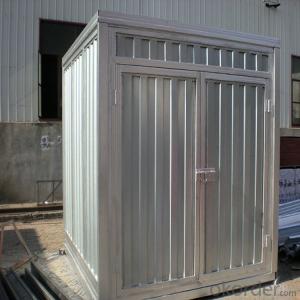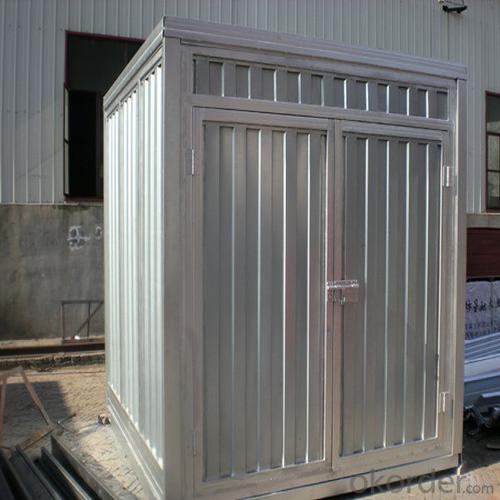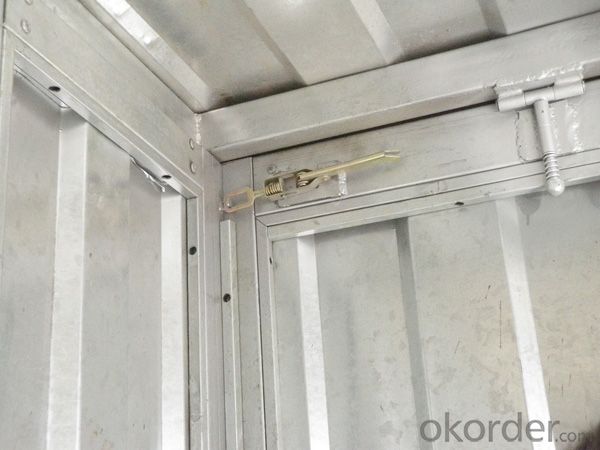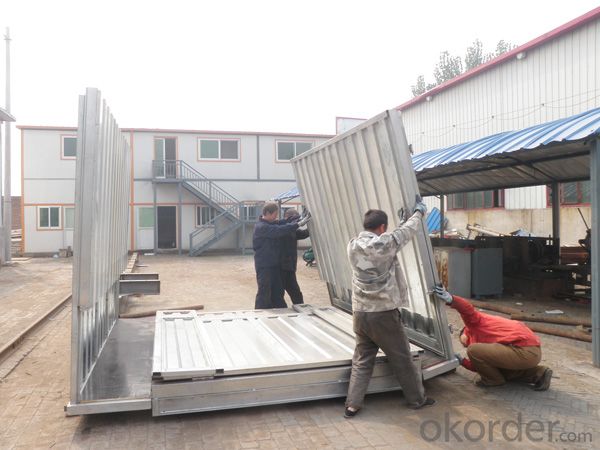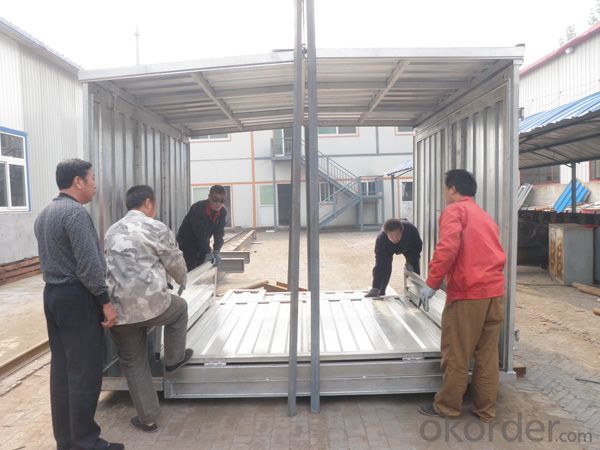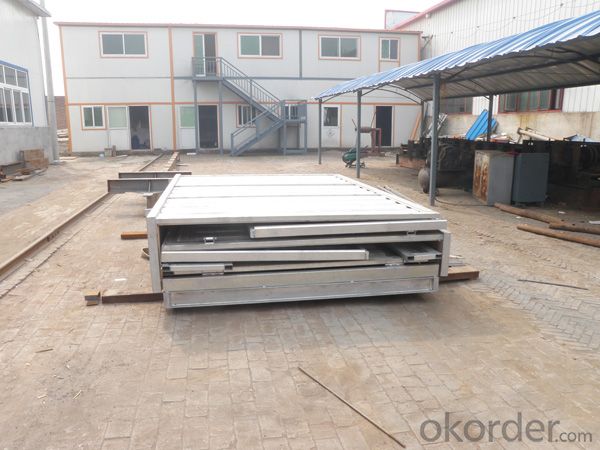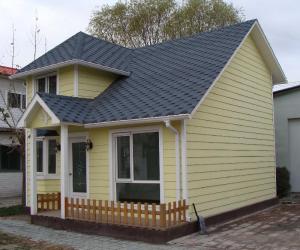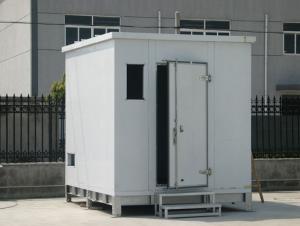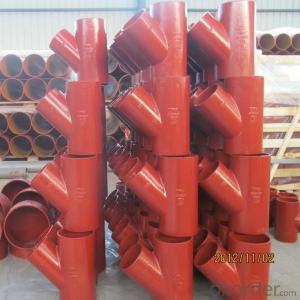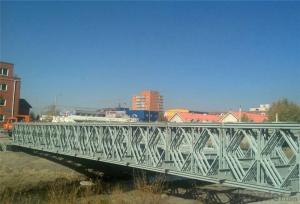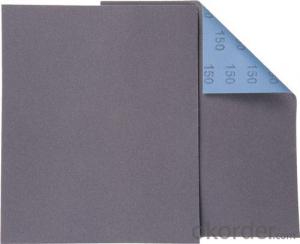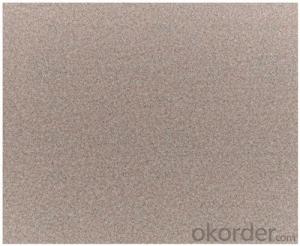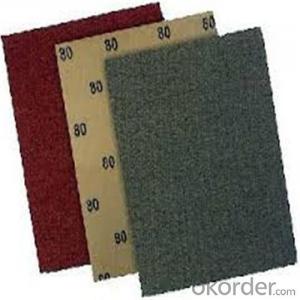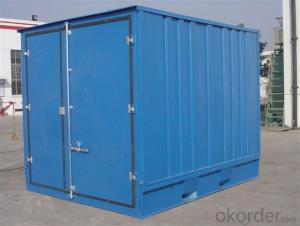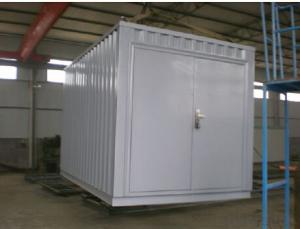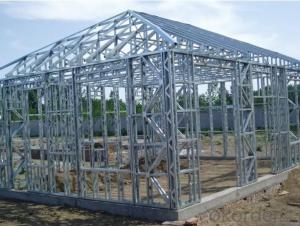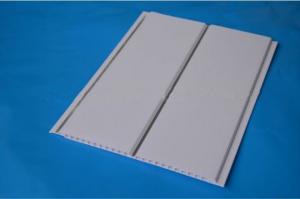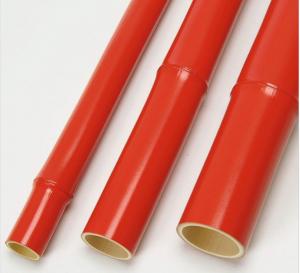Galvanzied Steel Storage Prefabricated House
- Loading Port:
- Tianjin
- Payment Terms:
- TT OR LC
- Min Order Qty:
- 6 set
- Supply Capability:
- 50000 set/month
OKorder Service Pledge
OKorder Financial Service
You Might Also Like
Galvanzied Steel Storage Prefabricated House
Description:
1. The house is made of light steel structure and rustproof color steel sandwich panel as wall and roof.
2. The size and layout can be designed as per customers' requirements for its flexible dimension
3. The house has waterproof structure and heating insulation material, such as EPS, Rock wool or PU Panels interlock easily to form a complete thermally efficient shell.
4. Two kinds of flooring system are available, one is steel chassis floor, the other is concrete foundation.
5. One 40’HQ container can load about 160m2 considering 75mm thickness panel for roof and wall;
6. Six skilled workers can finish 42m2 in 8 hours ;
7. The house can resist heavy wind load of 0.5KN/m2 and 7-8 degree seismic intensity.
8. DimensionAs per customer design or layoutLoading160 to 200m2 per 40’HQ container
Applications:
Family house for low income people, Temporary homes for disaster area, Holiday and vocation house…Remote site constructions camping, Warehouse , Work shop…Company office, Dining halls, Dormitories, Hospitals, Saloons, Entertainment centers…
FAQ:
1.How about the installation? For example, the time and cost?
To install 200sqm house needs only 45 days by 6 professional workers. The salary of enginner is USD150/day, and for workers, it's 100/day.
2.How long is the life span of the house?
Around 50 years
3. And what about the loading quantity?
One 40'container can load 140sqm of house.
Images:
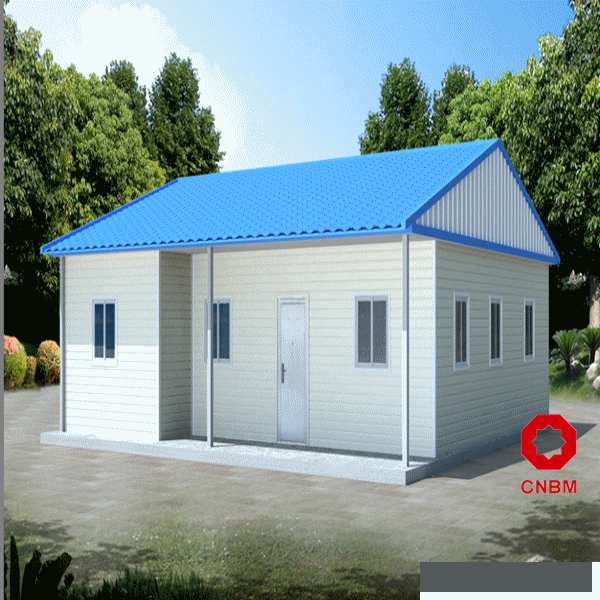
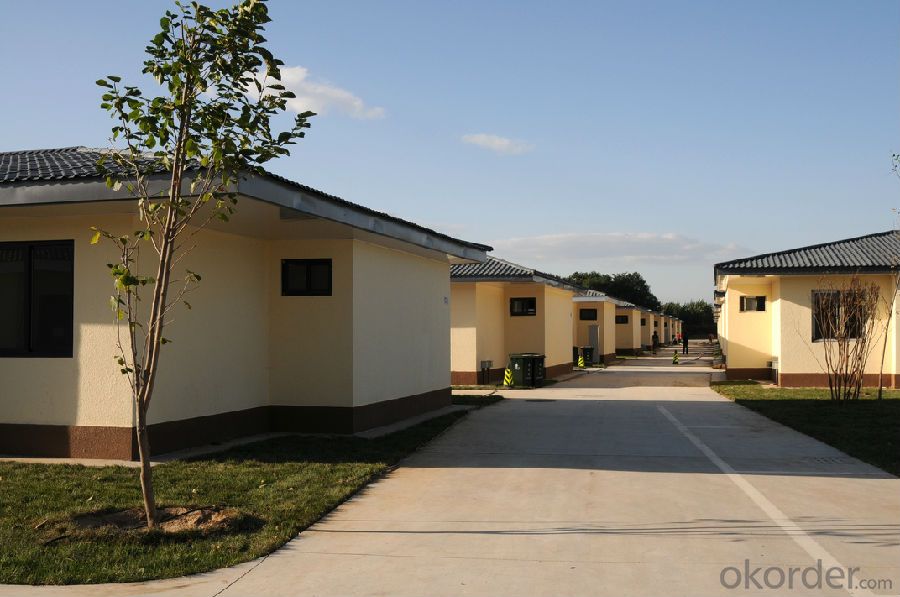
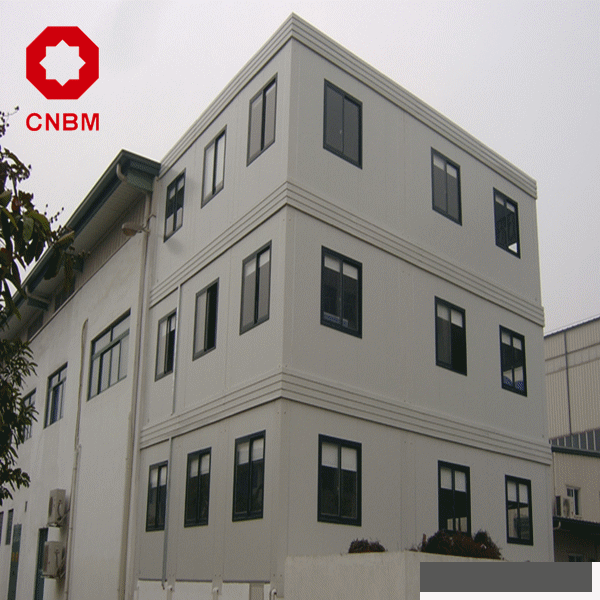
- Q: im interested in becoming a real estate agent but im not sure how to get start. i know i need 60 hours of approved real estate education but im not sure where to get it..any ideas?
- Liz, It is an always interesting business, even after 40 years. Start with your state department of real estate web site. That will detail what you need to do and provide you with the appropriate forms. The site usually lists approved education vendors as well, to help you decide where to do your 60 hours. Another option may be your local junior college or adult education program system. You may also wish to contact a few local real estate offices for more information. Some of these offer training, or can refer you to recommended education vendors. You will also learn a lot about what is required of an agent and may begin to form an idea of which company you will want to work with once you have your license. If you have time available, you may be able to apprentice with a successful agent to get a closer look at what the career involves before you make the time and money investment for the license. If you don't yet have relevant work experience in the field, this is an excellent way to get it - even if you work for free in the beginning. Making yourself invaluable to an employer is an excellent way to get to where you want to be. Warmest regards,
- Q: how much money has anyone made in the past year doing real estate in North Carolina? full time or part time. and how much money do you put in yearly? i really want to do real estate but i want to know what i am getting myself into before i begin. thanks...
- don't get into real estate. agents are a dime a dozen. and he 6% commission will soon be bye-bye. People don't want to pay it. With the Internet that will be reduced. Become a nurse.
- Q: hi~ about 10 years ago i bought a house with my borther in CA, and at that time the house is under me and my brother's name, but about a year ago my bro told me to sign a contract so he can refinanc the house, cus he's always beening nice to me so i didn't actually read the things, but about a month ago one of my friend who is a real estate agent told me that my name is no longer under the house, he is now saying i never gave any money to him to buy the house, and around this month he is selling the house, is there any ways i could get my money back?
- You do have a problem. You need to attack the deed to your brother as a 'fraud in the factum.' There are two kinds of transactional fraud: fraud in the inducement and fraud in the factum. Fraud in the inducement would be where your brother said, 'sign this deed and after I refi the house, I'll put your name back on it.' Your claim is that you would not have signed without his promise. This case would lose. Fraud in the factum results because he had you sign a document, a deed, while saying it was a contract to enable him to refi the house. Very hard case, but potentially winnable. Speak to an attorney, you need to sue your brother for this fraud. This is not a case of not reading the contract. It's a case where a person you used to love and trust lied to you and misled you and stole from you. Very different from what the Brand X poster described, but then, I actually went to law school and have 30 years' experience counseling clients and suing bad guys. I am sorry that your brother turns out to be a rotter. You will need to file a notice of pendency BEFORE the house closes escrow...and that will put the kibosh on the closing. Do it right away, and be prepared to move out, 'cos your brother sounds like a potentially dangerous grifter. The poster below me (he was above me, but you should be able to tell whom I'm referring to) is a person who appears to be impersonating an attorney. He has enough knowledge to get things right once in a while, but this (as is usually the case) is an area where actually graduating from law school would teach one how to respond to this problem. That he got this so very wrong emphasizes that he's not an attorney. Nor has he done much real estate title underwriting, or he would know that the fraudulent conveyance risk is one of the most common causes of loss in the industry. Seriously, what do you have to lose by filing a lis pendens? You've already lost your brother, that's evident (and sad, you have my sympathy).
- Q: Im 22 years old and say I make about 5000 dollars every month with my 9-5 job as an engineer.I am planning to achieve a goal of having positive cashflow of about 7-10 thousand dollars every month by the time I am 32 while working in my daytime job in the meantime. Does a plan like this seem plausible? Or do I need to quit my job at some point and dedicate all my effort in real estate investing?
- Most landlords will shoot for at least a $200 a month profit, in a great world they are earning $300 and in a fantastic situation that's $400... At $400 that's 17.5 units. At a $50K income, which I realize will increase over 10 years, isn't going to be close to allowing you to purchase that type of real estate.
- Q: My boss has asked me to find him all of the Real Estate Fund of Funds Managers with assets under management above a certain amount. Is there some place I can find a list or database that doesn't cost an arm and a leg to obtain? I don't care if the information is a year or two old, it would be a great start just to find one.
- There is also an index fund available that invests in REITs. Vanguard has two of them. One an ETF and the other a non-etf. Go to their web site to find out more. You might also try Morningstar but I was unable to find much there.
- Q: I would like to start a real estate company in Virginia with two other people. Only one of us will be a licesed realtor. Is that OK? Are there any resources out there than can help me plan this company? Thanks!
- Depends on what type of Real Estate you plan on doing. Will you manage apartment complexes, will you manage retail properties, or commercial, will you be selling homes? If you are selling homes, one of you needs to be a broker, a Realtor only holds a real estate sales associates license someone needs to be a Broker who handles and oversees other sales people. To be on the safeside one of you should have your brokers license, being that only one holds a license then as long as they have been licensed for two years then they can get a Brokers license. Requirements to sit for the Brokers exam is that you must have held a sales associates license for no less than 2 years.
- Q: During the early part of this decade their was a real estate boom and now as a result, their are a record number of people losing their homes.Was it inevitable that it would end up this way, or is there a way that this could have been controlled so that their would not this massive fallout?
- The problem was not what the homes sold for...that is where people are misunderstanding what is wrong with the economy. It's that the MAJORITY of the loans were appoved under adjustable rate mortgages, especially in subprime. So what happened, was that people's interest rates kept going up, taxes, insurance, and the payment kept going up...but their income DID NOT. Doesn't take long before you can't pay your bills. Stated income loans and no doc loans were really not the source of it...some, but not the main source...it was with adjustable rate mortgages being given to people that wanted to gamble with the market, buy homes that they could not afford...and when you gamble, sometimes you lose. That is what you saw happened. Like for me...my primary residence and ALL of my rental properties are all under fixed rates...my income has actually decreased with the mortgage mess (but has recently picked back up)...I am not having the financial problems that most of my fellow Realtor/investors are because of the fixed rates on my properties...because I always knew what I could afford and always knew how much money I would make. I have landlord friends who's rate has adjusted HIGHER than the lease their tenant is currently in....so the landlord is losing money each month, but there isn't anything he can do because the tenant is mid-lease....it's a two way contract.
- Q: I am about to graduate from high school and i am going to collge to be a real estate agent. But i have one question what is a " license " to be a real estate agent. I see it always on every bussiness website. Why do people get this licese thing for real estate what does it do ?Is it like a fake thing to be a real estate or What.As soon as i graduate im going to college for real estate but i dont understand the whole licese thing. Thanks for the help.
- You don't go to college to become a real estate agent. Depending where you're from, each state is different, you'll most likely have to become licensed to be a real estate agent. In Indiana, I know you have to have a license to list or sell someone elses property. What is your college major? If it's real estate, then you're wasting your time. Maybe you should call an agency you're interested in joining to find out more about the profession before you decide to make it your career.
- Q: what publications and reporters are primarily read by commercial real estate brokers and investors?
- Publications from the National Association of Realtors, Council of Residential specialists, Council of Real Estate Brokers, CPN, BOMI, CIRE, ICSC, ICSC Smart Brief, Multi-Housing News, Realtors Commercial Alliance, Real Estate CyberSpace Society, Commercial Property News, ARCHITECTURE, Tennessee Association of Realtors news letter. Most of these are profession publications that you will not be able to access unless you are a licensed real estate agent and/or a paid member of the trade organization. This is not all but many I read to stay on top of what is happening so that I add value to the services I provide. I excel in my market and am a source of knowledge for my client base.
- Q: I just graduated college with a bachelor's in marketing and I decided that want to get into real estate as a career. I know I have to get licensed, take pre-licensing courses. However, do I get licensed before I apply to different agencies? Or should I do this while I'm taking the classes, or do these places like to wait until your licensed before they hear from you? Also, does it matter where you go to take these classes? Like, in college, the more prestigious the college the better? Or as long as you get your license, thats all that matters? I know these questions sound completely amateur and I have been doing research over the past few days but, I can't seem to get a straight answer. Thank you!
- Here's how you do it: Contact the two or three largest real estate firms in your area. Ask them about their pre-licensing exams. Most will offer them. Try to choose a company you might like to work with. But that's not a requirement. Take the pre-licensing classes in as short a time period as possible. A typical schedule might be two evenings a week and all day Saturday for 3 weeks. Something like that is good. Don't stretch it out over months. Reason: The only reason you're taking the classes is to pass the licensing exam. A lot of what you'll learn will have no real use...but you need to know it. So you cram it into your head. Don't do an online-only program. You'll need to ask questions and get understandable answers. Don't do it at a community college. Those programs take way too long--like 2 hours an evening once a week for 20 weeks. You'll forget most of it before you take your state exam. But it doesn't matter where else. No, it's not like choosing a prestigious college. The only thing--THE ONLY THING--that matters is getting the knowledge necessary to pass the state licensing exam. Once you pass the pre-licensing program, you then take the state licensing test. Once you pass it, you can work with (not for--you'll be an independent contractor) any brokerage you want. It makes sense to seriously consider the one that you took the pre-licensing courses with--but that's not required. As a newbie, look for one that offers continuing education and additional support. You'll get a lower commission, but it's worth it. They won't be interested in you until you get that state-issued license. Your questions are good. However, I don't understand how you could have been doing research for days and not getting a straight answer. That concerns me. Hope that helps.
Send your message to us
Galvanzied Steel Storage Prefabricated House
- Loading Port:
- Tianjin
- Payment Terms:
- TT OR LC
- Min Order Qty:
- 6 set
- Supply Capability:
- 50000 set/month
OKorder Service Pledge
OKorder Financial Service
Similar products
Hot products
Hot Searches
Related keywords
